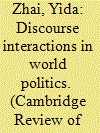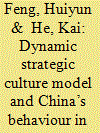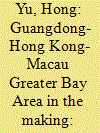|
|
|
Sort Order |
|
|
|
Items / Page
|
|
|
|
|
|
|
| Srl | Item |
| 1 |
ID:
183519


|
|
|
|
|
| Summary/Abstract |
Discourse, as a constructive power, plays a significant role in world politics. Rather than focusing on the formation or transformation of a single discourse, we investigate discourse interaction in the context of multiple competing discourses. Based on the theories of discourse interaction, this study analyses the realist dimension of discourse by examining the territorial dispute between China and Japan over the Diaoyu/Senkaku islands and shows how the two countries use discourses to pursue their own security and respective realist interests. This analysis identifies five major controversies in the two countries’ discourses on their claims of sovereignty over the islands and demonstrates that each of the two states uses both complementary and competing discourses to strengthen its own stance and delegitimize the other’s claims. The theoretical analysis of discourse interaction not only contributes to the growing research on discourse practices in IR, but also has important implications for practice-oriented strategic communication.
|
|
|
|
|
|
|
|
|
|
|
|
|
|
|
|
| 2 |
ID:
183516


|
|
|
|
|
| Summary/Abstract |
This paper provides a new theoretical framework to explain China’s strategic behaviour along with its rise and in doing so engages with the debate on strategic culture between Colin Gray and Alastair Johnston. We suggest that China’s behaviour is shaped by two variables: realpolitik realist threat perceptions on the strategic level and Confucian moralist cultural norms on the ideational level. In the case of a high strategic threat, China’s behaviour will be heavily influenced by the realpolitik variable in Chinese culture and become offensive in nature. Under low strategic threat, China’s policy will follow the Confucian tradition and thereby emphasize the non-use of force and resort to defensive principles. When external threats change from high to low, Chinese behaviour will feature a combination of ‘realpolitik’ and ‘Confucianism,’ that is, a self-constrained offensive policy. China’s foreign policy in the South China Sea after the Cold War is a case study that illustrates the utility of this new strategic culture framework.
|
|
|
|
|
|
|
|
|
|
|
|
|
|
|
|
| 3 |
ID:
183515


|
|
|
|
|
| Summary/Abstract |
The Chinese authority intends to develop the Guangdong-Hong Kong-Macau Greater Bay Area (GBA) as a new engine to sustain Chinese development. By applying the theories of state rescaling and city-cluster formation, this paper intends to conduct a case study of the GBA to examine the state-initiated plan for city-cluster formation in China, to analyse the Chinese central and local governments’ efforts to put this plan into action and the hurdles they face in formatting this city-cluster. The formulation of the GBA development plan for integrated development reflects a dynamic process of upscaling and downscaling of various levels of state power. The state’s plan for the GBA is to create a world-class city-cluster, and to eliminate barriers that hinder the free flow of goods and resources. Nevertheless, it will be challenging for Guangdong, Hong Kong and Macau, which fall under different administrative regions and customs zones, to achieve the level of collaboration and functioning required for integrated development of the GBA. The fierce competition for dominance among these core cities could jeopardise efforts to forge closer economic integration in the region.
|
|
|
|
|
|
|
|
|
|
|
|
|
|
|
|
| 4 |
ID:
183518


|
|
|
|
|
| Summary/Abstract |
The transition away from post-Cold War unipolarity has repercussions for regional orders that have been shaped and sustained by US preponderance. Small states like the United Arab Emirates (UAE), traditionally reliant upon extra-regional powers to balance against more powerful neighbours, are adopting an increasingly muscular foreign policy to hedge against a possible reduced US regional role. Consequently, there is an opening for non-traditional powers to adopt larger roles. Primarily using an outside-in approach, this paper explores the nature of China and Russia’s more active bilateral engagement with the UAE. It finds that in an environment where political instability within the larger Middle East combines with uncertainty about US intentions, regional leaders and leaders of extra-regional powers with interests in the Persian Gulf have to adjust accordingly, either to protect those interests or to take advantage of the opportunity to expand their presence in a strategically and economically important theatre.
|
|
|
|
|
|
|
|
|
|
|
|
|
|
|
|
| 5 |
ID:
183520


|
|
|
|
|
| Summary/Abstract |
This study focuses on the policy response of the Abe government (2012–present) to UNESCO’s inscription of the ‘Documents of Nanjing Massacre’ to argue that the historical revisionists’ perspective is central to the thinking of Japan’s UNESCO diplomacy. The UNESCO’s inscription heightened a sense of shame from the viewpoint of Japanese historical revisionists, leading the Japanese government to the unprecedented step of using its economic power to reform UNESCO’s Memory of the World programme and to prevent further inscription of historical documents that go against the view of the government. Because UNESCO constitutes the existing biographical narrative of Japan as a peace-loving, law-abiding country, the Japanese government remains careful to maintain a good-will posture to UNESCO. This article highlights the case of Japan to illustrate the importance of memory and identity change, as well as of the distinction between ontological security and the removal of threat to a historical narrative.
|
|
|
|
|
|
|
|
|
|
|
|
|
|
|
|
| 6 |
ID:
183517


|
|
|
|
|
| Summary/Abstract |
The article provides a framework for understanding the historical trajectory of China’s rise and its impact on the conventional stratification of the capitalist world-economy of the core, semi-periphery and periphery. Inspired by World-System Theory, the author analyses the process through which China’s global economic rise is challenging the status quo of the world-economy’s established structure. In other words, China’s economic rise is modifying the ‘classical’ stratification of the world economic zones as conceptualised by World-System Theory in terms of the core, semi-peripheral and peripheral relationships and in terms of the composition and proportional size of the three economic zones. As a result, the conventional stratification of a small core, a scattered larger semi-periphery and a vast periphery is being altered. The article goes through China’s different positions in the world’s economic stratification during different periods, and concludes that the global transformations led by China’s economic rise is leading the world towards a regional and global re-division of labour, which is exerting a great deal of impact on both the Global North and the Global South in terms of opportunities and challenges.
|
|
|
|
|
|
|
|
|
|
|
|
|
|
|
|
|
|
|
|
|